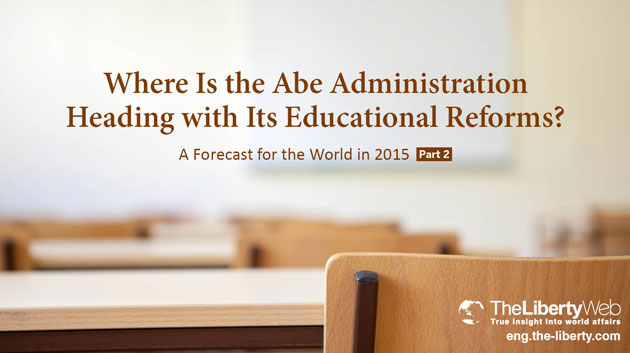Where Is the Abe Administration Heading with Its Educational Reforms?
A Forecast for the World 2015 (Part 2)
The LDP, a Japanese political party in support of big government, plans to intervene in issues related to people’s thoughts and beliefs, and to strengthen the tendency to restrict people’s personal freedoms.
On the other hand, the Happiness Realization Party (HRP), which favors limiting the size of the current government, wants to expand the freedoms of the Japanese people, and it plans leave university admissions up to free competition.
The Governor of Shizuoka Prefecture, Heita Kawakatsu, recently disclosed detailed results from this year’s national achievement tests on his prefectural government’s website. The Minister of Education, Culture, Sports, Science, and Technology, Hakubun Shimomura, met with the governor in Tokyo where he criticized Gov. Kawakatsu’s decision to release the test results, saying, “Governors do not have the authority to decide whether to announce the results.” Gov. Kawakatsu argued with him, saying that the guidelines for the release of the results were unclear.
The Abe administration has been promoting the “rebuilding of education,” and its basic goals have been the improvement of students’ academic abilities in order to become #1 in the world and to enhance students’ respect for social norms, history, and culture.
However, as the above exchange of opinions demonstrates, PM Abe’s plans have ended up only as empty slogans. After all, in accordance with his governing style, he simply follows precedents that he finds persuasive enough when deciding subsequent issues. PM Abe thinks in a bureaucratic way, which prevents him and his people from taking on new challenges.
What we’re seeing here is “big government”. The Abe administration seems to think that it’s the government’s role to suppress and control the private sector, and it has yet to realize that its way of thinking has been one of the reasons why Abenomics has come to a standstill.
The Happiness Realization Party (HRP) Advocates Liberalism in Education
Concerning the national achievement test, the HRP insists that municipalities or schools should release their students’ test results as part of a general disclosure of information regarding civil servants’ activities, and those educational administrations should introduce the principle of competition in schools. The HRP’s policy approves of students being evaluated according to their efforts and requires teachers to improve their skills by learning from others’ hard work.
This means liberalism in education, which encourages teachers to develop through friendly competition and nurtures children so that they’ll be able to spread their wings around the world.
HRP’s unique policies enrich moral and religious education, which is an advantage of having a religious party.
Only religion can answer the fundamental question, “What makes life precious?”, and moral education cannot exist without religion.
The HRP-proposed educational reform respects diverse values from around the world and aims to realize a limited government that not only maximizes the abilities of each child but also respects innovation and draws out the vitality of the private sector.



















